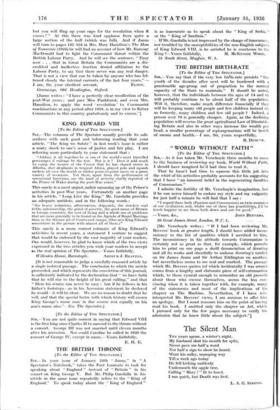KING EDWARD VIII
[To the Editor of THE SPECTATOR.] SIR,—The columns of The Spectator usually provide its sub- scribers with such good and informing reading that your article, " The King we Salute " in last week's issue is rather
a -nasty shock to one's sense of justice and fair play. I am referring more particularly to your statement that :
"Adding it all together he is one of the world's most travelled Personages if mileage be the test. But is it ? Does it add much to egitip the wearer of the Crown that he has chased steers in Albetta, shot elephants in tropical Africa, played polo and squash rackets all over the world, or ridden point-to-point races on a great variety of occasions. Yet these, apart from the performance of ceremonial functions, are the kind of activity chiefly reported of the Prince of Wales during the post-War years."
This surely is a most unjust, unfair summing up of the Prince's activities in post-War years. Fortunately on another page in his article, " Long Live the King," Mr. Guedalla provides an adequate antidote, and in the following words :
"the heavy industries, afforestation, shipyards, the stricken coal fields, salesmanthip, the grind of poverty, the good name of Britain in foreign countries, the cost of living and a whole sea of problems that are more generally to be found on the Agenda of Board Meetings than in the thinner air of Courts and camps. (One sees King Edward somewhere in the picture with almost all of them.)"
This surely is a more correct estimate of King Edward's activities in recent years, a statement I venture to suggest
that would be endorsed by the vast majority of your readers. One would, however, be glad to know which of the two views expressed in the two articles you wish your readers to accept as the real opinion of The Spectator.—Yours faithfully, . [It is not reasonable to judge a carefully-reasoned article by a single isolated passage. The conclusion to which the article proceeded, and which represents the conviction of this journal, is sufficiently indicated by the declaration that " we have faith that he will rise to the height of his great calling," and that " Here his course can never be easy ; but if he follows in his father's footsteps—as in his Accession statement he declared he would—it will be clear. We sec no reason to doubt that he will, and that the special lustre with which history will crown King George's name may in due course rest equally on his son's name also."—En. The Spectator.]










































 Previous page
Previous page